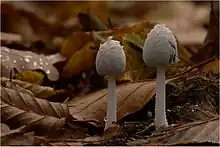| Coprinopsis nivea | |
|---|---|
_Redhead%252C_Vilgalys_%2526_Moncalvo_404556.jpg.webp) | |
 | |
| Scientific classification | |
| Kingdom: | |
| Division: | |
| Class: | |
| Order: | |
| Family: | |
| Genus: | |
| Species: | C. nivea |
| Binomial name | |
| Coprinopsis nivea (Pers.) Redhead, Vilgalys & Moncalvo (2001) | |
| Synonyms | |
|
Agaricus niveus Pers. (1801) | |
| Coprinopsis nivea | |
|---|---|
| Gills on hymenium | |
| Cap is campanulate | |
| Hymenium is adnate | |
| Stipe is bare | |
| Spore print is black | |
| Ecology is saprotrophic | |
| Edibility is unknown | |
Coprinopsis nivea is a species of mushroom producing fungus in the family Psathyrellaceae.[1][2] It is commonly known as the snowy inkcap.
Taxonomy
It was first described in 1801 by the German mycologist Christiaan Hendrik Persoon who classified it as Agaricus niveus.[3]
In 1838 it was reclassified as Coprinus niveus by the Swedish mycologist Elias Magnus Fries.[4][5]
In 2001 phylogentic analysis restructured the Coprinus genus and it was reclassified as Coprinopsis nivea by the mycologists Scott Alan Redhead, Rytas J. Vilgalys & Jean-Marc Moncalvo.[6]
Description
Coprinopsis nivea is a small inkcap mushroom which grows in wetland environments.
Cap: 1.5–3 cm. Starts egg shaped expanding to become campanulate (bell shaped). Covered in white powdery fragments of the veil when young. Gills: Start white before turning grey and ultimately black and deliquescing (dissolving into an ink-like black substance). Crowded and adnate or free. Stem: 3–9 cm long and 4-7mm in diameter. White with a very slightly bulbous base which may present with white tufts similar to that of the cap. Spore print: Black. Spores: Flattened ellipsoid and smooth with a germ pore. 15-19 x 8.5-10.5 μm. Taste: Indistinct. Smell: Indistinct.[7][8]
Etymology
The specific epithet nivea (originally niveus) is Latin for snowy or snow covered.[9] This is a reference to the powdery white appearance of this mushroom.
Habitat and distribution
Grows in small trooping or tufting groups on old dung, especially that of cows[10] and horses, Summer through late Autumn. Widespread and recorded quite regularly.[7]
Similar species
- Coprinopsis pseudonivea.
References
- ↑ "Mycobank Database - Coprinopsis nivea".
- ↑ "Species Fungorum - Coprinopsis nivea (Pers.) Redhead, Vilgalys & Moncalvo, in Redhead, Vilgalys, Moncalvo, Johnson & Hopple, Taxon 50(1): 229 (2001)". www.speciesfungorum.org. Retrieved 2022-07-17.
- ↑ "Species Fungorum - Agaricus niveus Pers., Syn. meth. fung. (Göttingen) 2: 400 (1801)". www.speciesfungorum.org. Retrieved 2022-07-17.
- ↑ "Species Fungorum - Coprinus niveus (Pers.) Fr., Epicr. syst. mycol. (Upsaliae): 246 (1838) [1836-1838]". www.speciesfungorum.org. Retrieved 2022-07-17.
- ↑ Fries, Elias Magnus (1836). Epicrisis systematis mycologici seu synopsis hymenomycetum. Bavarian State Library. Upsaliae : Acad. p. 246.
- ↑ Redhead SA, Scott A; Vilgalys R; Moncalvo J-M; Johnson J; Hopple JS; Hopple, John S; Johnson, Jacqui; Moncalvo, Jean-Marc; Vilgalys, Rytas (2001). "Coprinus Pers. and the disposition of Coprinus species sensu lato". Taxon. 50 (1): 203–241. doi:10.2307/1224525. JSTOR 1224525.
- 1 2 Buczacki, Stefan (2012). Collins fungi guide. London: Collins. ISBN 978-0-00-724290-0. OCLC 793683235.
- ↑ "Coprinopsis nivea, a rare inkcap mushroom". www.first-nature.com. Retrieved 2022-07-17.
- ↑ "Latin Definition for: niveus, nivea, niveum (ID: 27911) - Latin Dictionary and Grammar Resources - Latdict". www.latin-dictionary.net. Retrieved 2022-07-20.
- ↑ Pauline, N'Douba Amako; Claude, Kouassi Kouadio; Clovis, Koffi N'Dono Boni; Allal, Douira; Koutoua, Ayolié (2022). "Coprophilous fungi of Daloa city: New species for the fungal flora of Côte d'Ivoire". GSC Biological and Pharmaceutical Sciences. 20 (3): 251–260. doi:10.30574/gscbps.2022.20.3.0362.